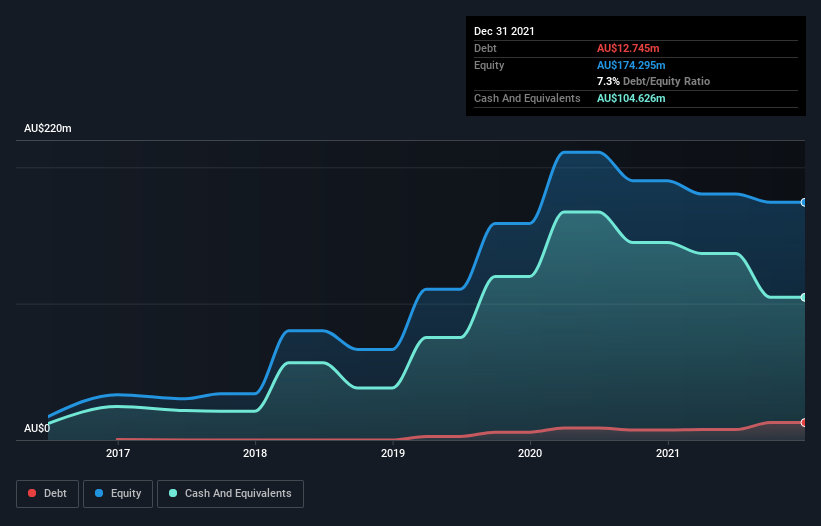
Some say volatility, rather than debt, is the best way to think about risk as an investor, but Warren Buffett famously said that 'Volatility is far from synonymous with risk.' It's only natural to consider a company's balance sheet when you examine how risky it is, since debt is often involved when a business collapses. We can see that Megaport Limited (ASX:MP1) does use debt in its business. But the more important question is: how much risk is that debt creating?
Why Does Debt Bring Risk?
Debt is a tool to help businesses grow, but if a business is incapable of paying off its lenders, then it exists at their mercy. In the worst case scenario, a company can go bankrupt if it cannot pay its creditors. While that is not too common, we often do see indebted companies permanently diluting shareholders because lenders force them to raise capital at a distressed price. Of course, plenty of companies use debt to fund growth, without any negative consequences. When we examine debt levels, we first consider both cash and debt levels, together.
Check out our latest analysis for Megaport
What Is Megaport's Net Debt?
The image below, which you can click on for greater detail, shows that at December 2021 Megaport had debt of AU$12.7m, up from AU$7.27m in one year. However, it does have AU$104.6m in cash offsetting this, leading to net cash of AU$91.9m.

How Strong Is Megaport's Balance Sheet?
We can see from the most recent balance sheet that Megaport had liabilities of AU$39.1m falling due within a year, and liabilities of AU$10.3m due beyond that. Offsetting these obligations, it had cash of AU$104.6m as well as receivables valued at AU$12.2m due within 12 months. So it can boast AU$67.4m more liquid assets than total liabilities.
This short term liquidity is a sign that Megaport could probably pay off its debt with ease, as its balance sheet is far from stretched. Succinctly put, Megaport boasts net cash, so it's fair to say it does not have a heavy debt load! When analysing debt levels, the balance sheet is the obvious place to start. But it is future earnings, more than anything, that will determine Megaport's ability to maintain a healthy balance sheet going forward. So if you want to see what the professionals think, you might find this free report on analyst profit forecasts to be interesting.
Over 12 months, Megaport reported revenue of AU$93m, which is a gain of 37%, although it did not report any earnings before interest and tax. With any luck the company will be able to grow its way to profitability.
So How Risky Is Megaport?
By their very nature companies that are losing money are more risky than those with a long history of profitability. And in the last year Megaport had an earnings before interest and tax (EBIT) loss, truth be told. Indeed, in that time it burnt through AU$44m of cash and made a loss of AU$37m. But at least it has AU$91.9m on the balance sheet to spend on growth, near-term. Megaport's revenue growth shone bright over the last year, so it may well be in a position to turn a profit in due course. Pre-profit companies are often risky, but they can also offer great rewards. There's no doubt that we learn most about debt from the balance sheet. But ultimately, every company can contain risks that exist outside of the balance sheet. We've identified 2 warning signs with Megaport , and understanding them should be part of your investment process.
At the end of the day, it's often better to focus on companies that are free from net debt. You can access our special list of such companies (all with a track record of profit growth). It's free.
New: Manage All Your Stock Portfolios in One Place
We've created the ultimate portfolio companion for stock investors, and it's free.
• Connect an unlimited number of Portfolios and see your total in one currency
• Be alerted to new Warning Signs or Risks via email or mobile
• Track the Fair Value of your stocks
Have feedback on this article? Concerned about the content? Get in touch with us directly. Alternatively, email editorial-team (at) simplywallst.com.
This article by Simply Wall St is general in nature. We provide commentary based on historical data and analyst forecasts only using an unbiased methodology and our articles are not intended to be financial advice. It does not constitute a recommendation to buy or sell any stock, and does not take account of your objectives, or your financial situation. We aim to bring you long-term focused analysis driven by fundamental data. Note that our analysis may not factor in the latest price-sensitive company announcements or qualitative material. Simply Wall St has no position in any stocks mentioned.
About ASX:MP1
Megaport
Provides on-demand interconnection and internet exchange services to the enterprises and service providers in Australia, New Zealand, Hong Kong, Singapore, Japan, North America, Italy, and rest of Europe.
High growth potential with adequate balance sheet.
Market Insights
Community Narratives




